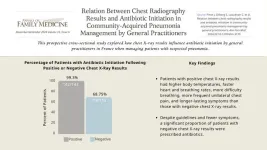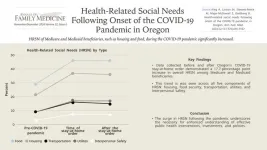(Press-News.org) Book the flight home for Thanksgiving, go to that party even though you’re tired, and write that thank you note. You may feel these experiences are not that significant in your busy life today, but according to Erin Westgate, assistant professor of psychology at the University of Florida, you are likely wrong.
Westgate and her team of researchers at the Florida Social Cognition and Emotion Lab recently received a grant from the National Science Foundation to investigate the factors that lead people to underestimate the meaningfulness of future life experiences.
“This started a long time ago when I was in grad school where I was talking to another student who asked me if we know how meaningful events will be in the future,” Westgate said. That was in the fall, just before the Thanksgiving holiday.
“Surely people know how significant Thanksgiving will be, right? It’s the poster child for gratitude and meaning,” she said.
After conducting a study with University of Virginia undergraduates, asking them about a week before the holiday how meaningful they expected it would be for them and comparing it to their answers after, the results were surprising. Students were overwhelmingly wrong in their estimate of feelings around the holiday, according to Westgate.
At UF, most of Westgate’s research is largely high impact lab-based, but during the pandemic in 2020, she decided to revisit the findings from her previous work. “We found it once, but can we find it again,” Westgate questioned.
With a larger sample of UF undergrads, Westgate saw the same result. People were clearly underestimating how meaningful their Thanksgiving holidays turned out to be.
“We want to live meaningful lives, we want to do meaningful things and so if we are not realizing that an experience is going to be meaningful, we may be less likely to do it and miss out on these potential sources of meaning in our own lives,” Westgate said.
The base of this new research is understanding that individuals make major decisions on how they anticipate a particular experience will make them feel. From large, life changing decisions such as choosing a career, or starting a family, to participating in holiday events and family gatherings, people make decisions, according to Westgate on choices that foster a sense of purpose and lead to a purposeful and fulfilling life.
The three-year study will use both field and lab experiments to discover why people tend to underestimate life experiences such as career choices, volunteer efforts and even mundane tasks like writing thank you notes and filing taxes. Both positive and negative experiences will be evaluated including the acceptance or denial of medical school applications.
The study will also explore meaningful growth experiences that involve discomfort. Here in particular, if discomfort is involved, individuals may avoid a particular decision that if carried out, could have a significant life impact in developing resilience and potential deep satisfaction of personal sacrifice.
“We don’t make sense of events until they actually happen. We don’t process events until we need to, when they actually happen and not before,” said Westgate. “If we try to make sense of things before they happen, the downside of that is that we are not appreciating how meaningful they will be.”
The goal of the research is to offer ideas on how we can fix this underestimation. When we more fully understand why people are making these mistakes in judgement, we hope we can move on to how we can potentially fix this problem, according to Westgate.
“Sometimes we go into a project, and we know what we are going to find. This is one of those projects that surprised us,” said Westgate. “I love a problem; I love a puzzle, and this was a puzzle I couldn’t ignore.”
END
Warning: Don’t miss Thanksgiving dinner, it’s more meaningful than you think
2024-11-25
ELSE PRESS RELEASES FROM THIS DATE:
Expanding HPV vaccination to all adults aged 27-45 years unlikely to be cost-effective or efficient for HPV-related cancer prevention
2024-11-25
Embargoed for release until 5:00 p.m. ET on Monday 25 November 2024
@Annalsofim
Below please find summaries of new articles that will be published in the next issue of Annals of Internal Medicine. The summaries are not intended to substitute for the full articles as a source of information. This information is under strict embargo and by taking it into possession, media representatives are committing to the terms of the embargo not only on their own behalf, but also on behalf ...
Trauma care and mental health interventions training help family physicians prepare for times of war
2024-11-25
Special Report
Background and Goal: In wars and conflict, family physicians are frequently called on to serve in expanded roles and are witnesses to the enormous mental and physical suffering of individuals, families, communities, and populations. This special report examines the role of family physicians in the Israel–Hamas conflict and other current wars to inform future practices in family medicine.
Key Insights: Family physicians must share timely, accurate information with colleagues on all sides of the conflict while acknowledging the narratives ...
Adapted nominal group technique effectively builds consensus on health care priorities for older adults
2024-11-25
Background and Goal: The participatory research approach is an important tool of family medicine and primary health care research. However, standard consensus methods like the Delphi and nominal group techniques can be time consuming and may not represent a broad range of opinions. To address these issues, researchers developed an adapted nominal group technique (aNGT) to efficiently build consensus among stakeholders with diverse perspectives.
Approach: This study focused on shaping care trajectories for adults aged 65 and older, aiming to prioritize key domains and identify new care indicators. Researchers used ...
Single-visit first-trimester care with point-of-care ultrasound cuts emergency visits by 81% for non-miscarrying patients
2024-11-25
The Bethesda Family Medicine Clinic in St. Paul, Minnesota, established a bi-monthly Early Pregnancy Dating & Risk Assessment Clinic in September 2022. The clinic introduced an integrated approach, combining point-of-care ultrasound with immediate, multidisciplinary first-trimester care. This integration allowed the clinic to quickly identify high-risk cases and offer timely intervention for issues such as miscarriage or abnormal pregnancies, reducing emergency visits, urgent clinic appointments, and first-trimester phone inquiries by 81% for non-miscarrying patients. Clinic implementation ...
Study reveals impact of trauma on health care professionals in Israel following 2023 terror attack
2024-11-25
Research Brief
Background and Goal: The October 7, 2023, terrorist attack in southern Israel forced the evacuation of countless individuals, placing intense demands on health care personnel. Primary care clinicians, who are at the forefront of treating severely traumatized evacuees, are often exposed to secondary trauma, which can affect their mental health and job performance. This study investigated the levels of burnout, well-being, and resilience among health care staff working in primary care clinics in Israel during the aftermath of the attack.
Study Approach: This cross-sectional ...
Primary care settings face barriers to screening for early detection of cognitive impairment
2024-11-25
Background and Goal: Early detection of cognitive impairment is essential for improving patient outcomes, but primary care settings face significant challenges in screening. This special report summarizes key points and gaps in knowledge about methods for detecting cognitive impairment in primary care clinics.
Key Insights: The report highlights the importance of addressing the rising incidence of cognitive impairment as the population ages, particularly with new treatments for early Alzheimer’s disease now available. It advocates for creative solutions to manage the increased workload, such as partnering with community health workers and leveraging telehealth. ...
November/December Annals of Family Medicine Tip Sheet
2024-11-25
Editorial
War Takes a Toll on Family Doctors Trying to Care for Patients
Background: This issue of Annals of Family Medicine includes four articles discussing the impact of the Israeli/Palestinian conflict on family doctors and patients in the region. These articles offer perspectives from academic family doctors who have firsthand experience living and working in the region to reveal the complexity and impact of this conflict.
Editorial Stance: The decision to publish these articles was ...
Antibiotics initiated for suspected community-acquired pneumonia even when chest radiography results are negative
2024-11-25
Original Research
Background and Goal: This study explored how chest X-ray results influence antibiotic initiation by general practitioners in France when managing patients with suspected pneumonia.
Study Approach: A prospective cross-sectional study was conducted with adult patients with suspected pneumonia who received chest X-rays as part of their evaluation. To analyze factors associated with antibiotic initiation, patients’ characteristics were compared at inclusion and at 28 days between patients with positive chest X-rays (indicating pneumonia) and patients with negative chest X-ray results.
Main Results: The sample included 259 ...
COVID-19 stay-at-home order increased reporting of food, housing, and other health-related social needs in Oregon
2024-11-25
Background and Goal: Efforts to address the health-related social needs (HRSN) of Medicare and Medicaid beneficiaries, such as housing and food, during the COVID-19 pandemic were insufficient. This research examined HRSN data from the Accountable Health Communities (AHC) study collected in Oregon to understand changes in HRSN for Medicare and Medicaid beneficiaries at the onset and during the first two years of the pandemic.
Study Approach: The study sample included 21,522 Medicare and Medicaid beneficiaries screened for overall health-related social needs between ...
UW-led research links wildfire smoke exposure with increased dementia risk
2024-11-25
As Baby Boomers hit retirement, about 1 in 6 Americans is now over the age of 65. The number of Americans living with dementia is projected to skyrocket — but the proportion of older Americans who develop dementia has actually decreased. The exact reason why is uncertain, but various lifestyle and environmental factors can influence a person’s risk of cognitive decline.
One recently discovered risk is air pollution. Studies have linked exposure to a type of air pollution called fine particulate matter, or PM2.5, with an increased risk of developing dementia, and researchers suspect ...

